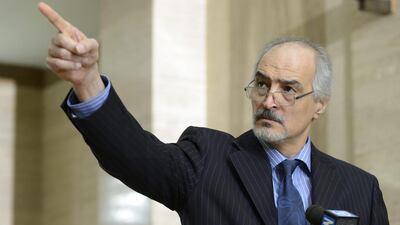How things have changed since Syria was suspended from the Arab League in 2011. As negotiations in Geneva haltingly begin to find a solution to the Syrian conflict, those who have pushed for Bashar Al Assad’s removal find themselves on the defensive.
The reason for this, above all, is the western and Arab preoccupation with ISIL and Jabhat Al Nusra. This has neutralised all serious efforts to undermine the Assad regime, for fear that jihadist groups will benefit.
Such an attitude created an opening for Russia to intervene militarily in Syria last year and shift the balance in Mr Al Assad’s favour. Rather than widen the rift with the United States, the Russian move led to greater coordination between Moscow and Washington. The Geneva talks are one consequence of this.
However, from the perspective of two regional powers, Saudi Arabia and Turkey, the situation is worrisome. While the Obama administration will not admit it, the rapprochement with Iran and Russia, Mr Al Assad’s principal backers, is subtly shaping American aims in Syria. The Saudis and Turks, once leading American allies in the Middle East, are now viewed more as spoilers.
But if the Saudis are anxious about America, they should be even more concerned about the other Arab states. What had been an Arab consensus over Syria seems lost today. Of Syria’s neighbours, only Turkey would still welcome the forcible removal of Mr Al Assad. And among the Arab countries further away, who can the Saudis really count upon to back a military solution?
Jordan, Iraq, and Lebanon all dread the triumph of jihadists in Syria, even if there is support for Mr Al Assad’s foes among their populations. Egypt, Algeria and, probably, Tunisia have similar worries, with the Egyptian turnaround perhaps the most significant. By and large, the Syrian opposition is backed unreservedly only by the Saudis, Qataris and other Gulf states.
Two things are dangerous in such a situation. The first is that without inter-Arab agreement over Syria, more room has been created for outsiders to impose their preferred solutions on the country. Indeed, the United States, Russia and Iran appear more or less in agreement on one thing, namely allowing ambiguity to prevail over Mr Al Assad’s future so talks can progress.
The start of the Geneva negotiations showed the pitfalls of this situation. The Syrian opposition is still threatening not to participate unless the Syrian regime and its allies stop attacking civilian areas. The Americans, usually so keen to introduce confidence-building measures in negotiations, have demanded none from Mr Al Assad or Moscow. Rather, they have allowed Russia to manage Syrian flexibility, allowing Moscow and Damascus to work together in a good cop, bad cop routine.
This Russian-American diplomatic ballet, in support of the United Nations envoy on Syria, Staffan de Mistura, has left the Saudis and Turks in the lurch. Indeed, Mr de Mistura recently criticised Riyadh, without naming it, for complicating his efforts to find a solution to the crisis, because it sought to control which opposition groups could go to Geneva. Mr de Mistura said nothing about Mr Al Assad or Russia, who seek to do the same.
If the Saudis and Turks are viewed as obstacles to an emerging consensus – no matter how dubious the principles around which the consensus builds – that will be to their disadvantage. Coming on the tails of the breakdown in Arab unity against Mr Al Assad, this can only further harm Saudi and Turkish interests.
A second danger is that as the Saudis and Turks feel more insecure, they may respond in rasher ways, compounding their isolation. Turkish opposition to Kurdish gains in Syria, for instance, while defensible on national-security grounds, has created a sense that Ankara will use ISIL against the Kurds. That’s hardly beneficial given apprehension with ISIL all around.
By the same token, Saudi claims that Mr Al Assad will be removed by force if he refuses to exit voluntarily, while perhaps comprehensible, jar with the political mood these days. Anything the Saudis do to implement that promise is bound to be seen as undermining the negotiations and benefiting jihadists. Yet if they fail to make good, Saudi standing will suffer.
It’s difficult to see a way out of this situation. American reassurances to the Saudis and Turks are unlikely to work, so discredited is the Obama administration over Syria. Rather, what is needed is some kind of mechanism so the Arab states can take stock. This seems an ideal time for an Arab summit, to define a common position on Syria. However, the fact that the Saudis may find themselves in a minority makes one unlikely.
Some may take satisfaction in seeing the Saudis and Turks in trouble, yet that would be foolish. Any durable solution in Syria must be endorsed by both countries. But Riyadh and Ankara also have to avoid damaging inflexibility. The only beneficiary from their marginalisation would be Mr Al Assad.
Michael Young is opinion editor of The Daily Star in Beirut
On Twitter: @BeirutCalling


